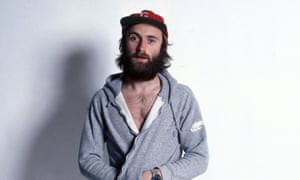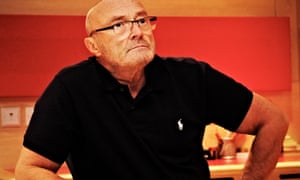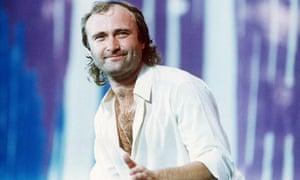
In 2000, Phil Collins developed sudden deafness in one ear owing to a viral infection. Most professional musicians would have been horrified. Collins, however, was perversely relieved. “In a way, I felt like I was a slave to the thing,” he says, meaning his career. “This was like: ‘Sorry man, I can’t do it.’ That’s God saying: ‘Time to stop.’”
His hearing stabilised; his self-esteem did not. When he started dating US news anchor Dana Tyler in 2007, he asked her to call him Philip. Phil Collins was that other guy. Phil Collins had baggage. He was sick of Phil Collins. He compares it to The Bowmans, an episode of Hancock’s Half Hour in which Tony Hancock lands a role in an Archers-style radio drama, but is so annoying that he gets written out. “I felt like that was me. I wanted to be written out of my own script. There were too many things stuck to me that I couldn’t get rid of.” In 2011, he announced his retirement from music.
Some musicians are indelibly cool while others were never cool, but it must be disorientating to enjoy credibility for over a decade and then lose it. In the 1970s, Collins was the revered drummer of Genesis, and he still features in the top 10 of polls of rock’s greatest drummers. In his 30s, with 1981’s Face Value and its indelible hit single In the Air Tonight, Collins became an unlikely everyman megastar. Looking back, the scale of his imperial phase is mind-boggling: “A lot bigger than I remember it being,” he says. He had seven US No 1 singles, behind only Michael Jackson. He sold more than 100m solo albums, and about the same number with Genesis, who he fronted after Peter Gabriel’s departure in 1975. Grammys and Brits galore. Level-headed and approachable, Collins was pop’s Mr Nice Guy: not cool any more, but well-liked.
'I just wanted to get off the roundabout,” he says of his retirement. “I had had enough, frankly.'
That changed in the 1990s, when Collins became known as the Tory tax exile who divorced his second wife by fax (we’ll get to that). His popularity waned. For younger musicians such as Noel Gallagher, he became the Great Satan: a symbol of everything that was rotten about the 1980s. Always sensitive to criticism, Collins was floored by the backlash and never really recovered. “I just wanted to get off the roundabout,” he says of his retirement. “I had had enough, frankly.”
We’re sitting in the deserted offices of Warner Music on a dreary Friday afternoon. At 64, Collins looks less than ever like a pop star: bald and bespectacled in checked shirt and jeans, walking slowly with the aid of a stick. A 2009 injury to the vertebrae in his upper neck affected his left hand, which means he can’t drum again without learning a completely new technique.

Collins was up early to do breakfast TV so it’s been a long day, but he can’t complain. Being busy means people are interested in him again. A longstanding favourite with hip-hop and R&B artists, he was a major influence on Kanye West’s anhedonic 808s & Heartbreak album. Adele, who talked to him about working on her third album, called him “a genius”. Lorde tweeted: “my love for phil collins is a beautiful thing”. Members of Sleater-Kinney, Yeasayer and Sleigh Bells have come out as fans. It’s not just down to nostalgia or the guarded enjoyment of a guilty pleasure. You can see why hip-hop producers would admire his rhythms, and why Adele and Lorde would be drawn to the sleek intimacy of chart-topping ballads such as One More Night and Against All Odds. “These days,” Charles Aaron recently wrote in the New York Times, “you speak ill of Phil at your own risk.”
So it’s a good time for Phil Collins to come back – or at least, he says, “back a bit”. Contrary to reports, he has not yet decided to tour again (“If I can’t be as good as I was, I’d rather not do it at all,”) and has yet to get back into the songwriting groove. But he’s writing a memoir and he’s remastered all of his solo albums, with bonus live recordings and demos, under the banner Take a Look at Me Now. The title sounds like a plea for reassessment.
Like his songs, Collins is disarmingly direct. Far from the haunted, Alamo-obsessed figure depicted in a Rolling Stone profile five years ago, he’s friendly and drily funny, but there’s an unmissable undercurrent of bruised melancholy and a residual wariness from years of being derided. Reading what people say about him, he says, takes him “up the ladder and down the snake”. The day before we meet, a journalist informed him that David Bowie had once described his mid-80s trough as “my Phil Collins years”. Collins’s face falls at the recollection.
Retirement didn’t work out. He planned to devote his time to his two sons, with third ex-wife Orianne Cevey, in Switzerland, but then Cevey moved to Miami with the kids. He filled his days with watching sport on telly while drinking wine and vodka. “I had never been a serious drinker, but suddenly I had a lot of time on my hands,” he says matter-of-factly. “Plus I felt I owed it to myself because I’d been on the road all my life.” When he started having health problems, however, he quit. Things are looking up. He recently rekindled his relationship with Cevey and moved to Miami – an apt home for a man who once played “Phil the Shill” in Miami Vice. “We realised we missed each other,” he says. “We made a mistake and we’ve fixed it.”
Collins’s marital arrangements are of particular interest because he owes his entire solo career to his first divorce. If Andrea Bertorelli hadn’t left him in 1979 … “we wouldn’t be here,” he finishes. “This is entirely true.”
Raised in Hounslow by an insurance man and a theatrical agent, Collins was a child actor before joining Genesis in 1970 at the age of 19. A sociable chap and a versatile, jazz-influenced drummer, Collins played for the likes of Robert Fripp, John Cale and, on four consecutive albums, Brian Eno. “I learned a lot from him,” Collins says. “He would come in with something he’d done the night before at home. He didn’t care if it was hissing. I got real confidence from him to actually use my home demos.”
When Bertorelli and their two children moved out, he filled the time by recording heartfelt demos in his home studio. While he was playing Genesis’s 1980 album Duke to Ahmet Ertegun at Atlantic Records, Ertegun asked to hear the demos. “He said, ‘Man, that is fantastic. It has to be a record.’ That was the point where I realised I was making a record. It wasn’t on my radar at all.” The resulting album, 1981’s Face Value, is an intriguing debut, wandering between art-rock and soulful MOR. Combining emotional suspense with studio innovations (notably producer Hugh Padgham’s colossal gated drums), In the Air Tonight became one of the decade’s touchstones and still lends neurotic power to 80s-set dramas such as The Americans and Deutschland 83. But Face Value’s most potent quality was its emotional transparency. Like the pensive portrait on the cover, the songs addressed the listener with unflinching directness.
“People used to say to me, ‘Don’t you feel embarrassed showing your dirty laundry?’” he says. “And really, I didn’t, because it was the only way I knew how to write songs. With Genesis it had all been surreal and science fiction. I felt this was more me.” He frowns. “Of course, to my ex-wife it was me telling my side of the story. It was resented.” The angrier songs on 1983’s Hello, I Must be Going! were influenced, he says, “by letters arriving in the post with demands”.
In between solo albums Collins also steered Genesis into the mainstream, produced records for John Martyn and Adam Ant, and played drums for Robert Plant and Paul McCartney. Even if he hadn’t been too sensible to blow his cash or get mired in drink and drugs, he was too busy. “I never really stopped and smelled the roses,” he says wistfully. “I’ve always been snowploughing my way forward while things happened behind me. People throwing money in a bucket.”
Following Collins’s Oscar-nominated theme song for Taylor Hackford’s Against All Odds, 1985’s No Jacket Required was his blockbuster, with a string of hits that never left the radio. It sold 12m copies in the US alone, much to Collins’ surprise. “I’m riddled with insecurity,” he says. “‘Surely this can’t go on. Isn’t there some mistake?’ But no, it kept going.” At the suggestion of promoter Harvey Goldsmith, he played Live Aid in two countries, flying from London to Philadelphia by Concorde and helicopter. “That was the nail in the coffin,” he says. “Not only do I play it once but I play it twice. Fucking show-off.”
He didn’t consider the way it looked until later. “I enjoyed the work. It was more about the music than the fame.”

Perhaps, I say, it was unwise to put a huge picture of his face on every album cover. “Yeah, well,” he says with a rueful laugh. “That’s one to you. It wasn’t from an ego point of view. I’d already had more than my fair share of, ‘This unlikely looking guy from England. This short, dumpy, bald guy who’s now singing with Genesis …’ But as a conceptual idea, it really worked.”
There really was no avoiding Phil Collins. There was the 1988 film Buster, in which he starred as Great Train Robber Buster Edwards. Another blockbuster, 1989’s … But Seriously, at the time Britain’s fastest-selling album ever. Two multi-platinum Genesis albums. Constant airplay. Ubiquity bred contempt and Collins was deemed the epitome of yuppie MOR: “BMW music”. When Bret Easton Ellis created Wall Street sociopath Patrick Bateman in American Psycho, he made him a Phil Collins fan. To make matters worse, Collins’ former Genesis bandmate Peter Gabriel was simultaneously enjoying commercial success and critical acclaim. “Whatever I did was compared to Peter. Peter was far more intellectual than I was.”
“I was always there,” Collins says. “I was always in your face. People were always talking about me, usually not in a nice way. There was definitely too much of me.”
Collins is too thin-skinned for this business. He has never really come to terms with the distorting effects of fame. At heart, he believes that if you’re honest, then people won’t misunderstand you. He even used to call up writers and editors to complain about factual errors. One critic in Indianapolis picked up the phone to hear the words: “It’s Phil Collins here. I just read your review. You’re not very good at this, are you?” Andy Warhol’s maxim, “Don’t read your reviews; weigh them,” clearly cuts no ice. He still remembers every stinker, “where they were and who wrote them”. Like the critic in San Francisco who branded him the McDonald’s of pop. “I couldn’t work out how this was happening, because the 15,000 people the previous night had loved it. This one guy, why didn’t he like it?” he says, frowning. “You start wondering where those people are in the audience. You become obsessed with it.”That way madness lies. I suggest to Collins that it seems odd that someone so rich and famous would be so wounded by bad reviews.“I know! I know! I’m much better now, but I remember these things.” He sighs. “I feel that when we’re talking about this I come over as whingey. ‘Why can’t you just enjoy it?’ Well, I did enjoy it, and I can now look at it with some balance, and understand it.”
Collins’ biggest regret (apart from covering the sappy Mindbenders hit A Groovy Kind of Love) is talking to the Sun about politics. “Anything!” he clarifies. “I regret talking to the Sun about anything.” On the day before the 1992 general election, Bizarre columnist Piers Morgan quoted Collins as saying: “If they put up taxes, I’d consider going abroad.” This single line, mutated via Chinese whispers into a cast-iron vow to emigrate if Labour won, proved disastrous. “I remember getting letters from nurses saying, ‘That’s it, I’m not buying any more of your records,’” he says glumly. “I didn’t mean it the way it came out.”
Did he ever vote Conservative?
“I didn’t vote, actually. And that’s not something I’m proud of. I was just so busy that I rarely was here.”
His reputation really tanked the following year, when the Sun printed an angry fax Collins had sent to his second wife, Jill Tavelman. He says it was actually written once the divorce was underway, but people assumed that was how he broke the news. No more Mr Nice Guy. “My fanbase had become female: ‘Isn’t he lovely?’” he says. “Straight away they thought I was a bastard. So life took a real bump, at that point.”
Collins’ 1993 album, Both Sides, written in the wake of a marriage-ruining affair with an old flame, was his best and most personal since Face Value. “That’s the real me,” he says, implying that his biggest albums weren’t. But it underperformed, and didn’t change anyone’s minds about him. From then on, despite successes such as his Oscar-winning soundtrack for Disney’s Tarzan, he felt that he couldn’t set the record straight.
“It was like coming out of a toilet with toilet paper on your foot and trying to walk elegantly whilst trying to get it off,” he says. “I think that’s one of the reasons I did retire, frankly. It seemed that the only way I could stop this was to stop and start again. I stopped. I’m yet to start again.”
Outside, the afternoon is fading to black. We’ve gone down a gloomy path, so I close by asking Collins what he would most like people to know about him. He ums and ahs, like he’s not sure it would make any difference.
“It’s got so complicated,” he says finally, “because I’m known for this and known for that, but really I’m quite a simple guy, just trying to do it right.”
It’s a slow process but, like a lot of people, Phil Collins is learning to like Phil Collins again.
reference soucrce:the guardian today
reference soucrce:the guardian today